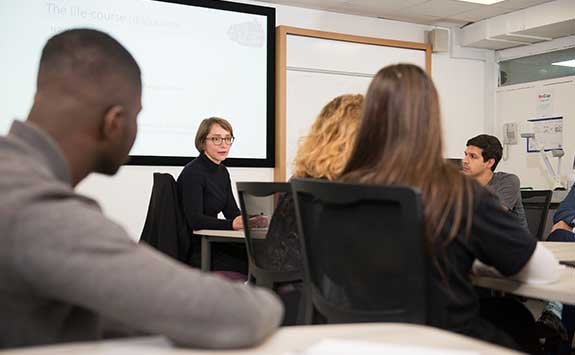Sociology Research Degrees
Applications and enquiries are welcome from students in any of our areas of research expertise.
Dynamic and innovative research
Our researchers have an excellent research profile. They have a reputation for producing dynamic and innovative work with strengths in:
- family studies
- health studies and political economy
- cultural criminology
- sexuality
- citizenship
- youth and student lives
- migration
Our research embodies an ethos of interdisciplinary social science. This is also found in the Policy, Ethics, and Life Sciences Research Centre, where some of our PhD students are based.
We are recognised by the Economic and Social Research Council (ESRC) for PhD training and part of the NINE Doctoral Training Partnership which offers an annual competition for PhD scholarships.
Postgraduate research in Sociology at Newcastle provides high-quality postgraduate education and an inclusive, supportive research environment.
Our community
Our postgraduate community is vibrant and diverse with students engaged in a wide range of sociological, anthropological and criminological research.
Our postgraduate students run a lively and interesting blog.
Postgraduate students participate in and lead special events and workshops and are closely involved in the Sociology seminar series.

I completed my degree at Newcastle & I knew it was exactly the sort of place I wanted to do my PhD. The academic staff are fantastic & I've felt supported every step of the way.
Interdisciplinary links
Sociology plays a major role in the cross-faculty Gender Research Group. Cross-school research synergies are also being promoted through research institutes including the Newcastle Institute for Sustainability and the Newcastle Institute of Creative Practice. Postgraduates also engage with a number of research centres across the faculty.
We have numerous international links in our research activities and a number of our postgraduates carry out fieldwork in a range of international locations, including for example Taiwan, Korea, Germany and India.

Current doctoral students are conducting research into issues such as:
- sexuality and gender
- domestic violence
- childcare, inter-country adoption and lone parenthood
- end of life healthcare decisions
- young peoples’ educational choices
- translation professions and networks
- online dating
- digital society
See a list of our current research students and their projects.

Finding a supervisor
Before applying for a research degree, you should find a supervisor from our Sociology colleagues. They should specialise in the area of research you're interested in. You can contact our Sociology Postgraduate Director for further advice.
Find out about research areas in Sociology and the particular interests of colleagues.
You could also take a look at some of our postgraduate students' research profiles.

Your research proposal
A research proposal is an important part of a doctoral application.
The proposal needs to written in a clear way and it should include the following:
- Title: this should reflect the proposed topic. At the application stage, this might well be a working title.
- Overview of the research: this should provide the aim and objectives of the proposed research; research questions; and how the research aligns with the research areas in Sociology at Newcastle.
- Case for support: this section should discuss the relevance and significance of the research. This section should include important literature in the area of study and the identification of any existing gaps in knowledge that the research will address. This section will show an applicant’s knowledge of the subject area and make a case for the need for this research.
- Research design and methodology: this section should outline the overall research design, methodology, methods and type of analysis required to address the research questions.
- References: these support the argument you make in the proposal and will indicate your level of knowledge and the approach you are aiming to take. This will help the reviewers to assess your application and help to assign appropriate supervisors.
Your proposal should outline your project and be around 1,500 words (including references and bibliography).
The following books may help you to prepare your research proposal.
- Bell, J. (1999): Doing Your Research Project: A Guide for First-time Researchers in Education & Social Science, (Oxford University Press, Oxford).
- Baxter, L, Hughes, C. and Tight, M. (2001): How to Research, (Open University Press, Milton Keynes).
- Cryer, P. (2000): The Research Student's Guide to Success, (Open University, Milton Keynes).
- Delamont, S., Atkinson, P. and Parry, O. (1997): Supervising the PhD, (Open University Press, Milton Keynes).
- Philips, E. and Pugh, D. (2005): How to get a PhD: A Handbook for Students and their Supervisors, (Open University Press, Milton Keynes).
